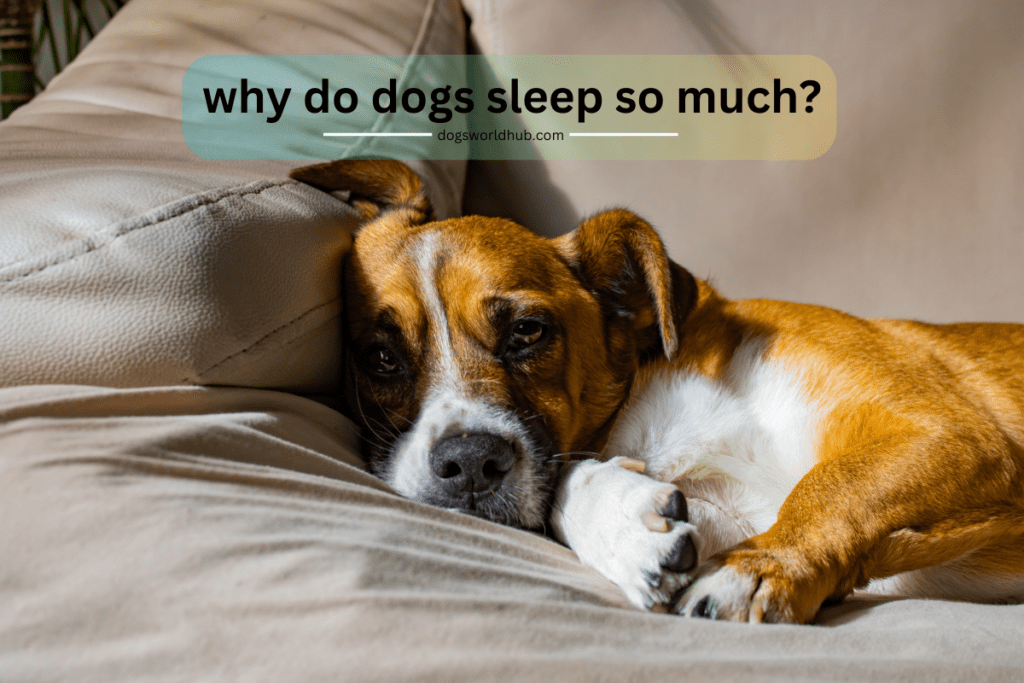Dogs are known for their love of sleep. It’s not uncommon to see a dog snoozing in a sunny spot, curled up on a comfy bed, or even sprawled out on the floor. But why do dogs sleep so much? To understand this behaviour, it’s essential to delve into various factors including their physiology, evolutionary history, lifestyle, and health.
Why Do Dogs Sleep So Much?
Dogs love to sleep a lot, usually around 12 to 14 hours each day. This is because of their natural habits, lifestyle, and age. Just like wild dogs, they need to save energy for times when they are active, like playing or hunting. Puppies, big dogs, and older dogs often sleep even more because they need extra rest for growing and staying healthy. Sleeping also helps dogs remember things and feel good overall. Knowing why dogs sleep so much can help pet owners make sure their dogs are healthy and happy.
Physiological Needs
Dogs, much like humans, have physiological needs that dictate their sleep patterns. On average, adult dogs sleep between 12 to 14 hours a day, while puppies, older dogs, and certain breeds may sleep even more. This extensive sleep is crucial for several reasons:
- Energy Conservation: Dogs are descendants of wolves, which are known to be highly active during hunting and conserve energy by resting when not hunting. Despite domestication, this trait persists in modern dogs. Sleeping helps conserve energy for when it’s needed most.
- Physical Growth and Repair: For puppies and young dogs, sleep is essential for growth. During sleep, their bodies release growth hormones that facilitate development. Additionally, sleep aids in repairing muscles and tissues, which is crucial for active dogs.
- Brain Function and Learning: Sleep plays a vital role in cognitive function and memory consolidation. During sleep, a dog’s brain processes the information gathered throughout the day, helping with learning and memory retention. This is particularly important for puppies and dogs undergoing training.
Evolutionary Adaptations
Understanding the evolutionary history of dogs can provide insights into their sleep patterns. Wild ancestors of domestic dogs had to adapt to various challenges for survival, leading to sleep behaviours that have persisted over time.
- Crepuscular Nature: Wolves, the ancestors of dogs, are crepuscular, meaning they are most active during dawn and dusk. This activity pattern has influenced domestic dogs, making them prone to long periods of rest during the day and night.
- Safety and Survival: In the wild, resting during the day reduces exposure to predators and harsh environmental conditions. This instinct to sleep during safer times has carried over to domestic dogs, even though they live in secure environments.
- Pack Behaviour: Wolves live in packs with a clear social hierarchy, where resting together strengthens social bonds and ensures collective safety. Domestic dogs, being social animals, often sleep close to their human families or other pets, mirroring this pack behaviour.
Lifestyle and Environment
A dog’s lifestyle and environment significantly impact its sleep patterns. Various factors within a domestic setting contribute to the amount of sleep a dog gets.
- Activity Levels: Dogs with high activity levels, such as working dogs or those engaged in regular exercise, tend to sleep more to recover from physical exertion. Conversely, sedentary dogs may sleep out of boredom or lack of stimulation.
- Diet and Nutrition: A well-balanced diet plays a role in a dog’s energy levels and sleep needs. Proper nutrition supports overall health and can influence how much a dog sleeps. Malnutrition or poor diet, on the other hand, can lead to lethargy and increased sleep.
- Mental Stimulation: Dogs require mental stimulation to stay healthy and happy. Lack of mental challenges can lead to boredom and increased sleep. Engaging a dog in training, play, and problem-solving activities can help balance their sleep-wake cycle.
- Comfort and Safety: The environment in which a dog sleeps greatly affects its sleep quality. A comfortable, quiet, and safe sleeping area encourages restful sleep. Dogs that feel secure in their environment are more likely to sleep soundly and for longer periods.
Health and Age Factors
A dog’s age and health status are critical determinants of its sleep patterns. Different life stages and health conditions can lead to variations in sleep duration and quality.
- Puppies and Adolescents: Puppies, like human babies, require a lot of sleep for growth and development. They can sleep up to 18-20 hours a day. As they grow into adolescence, their sleep needs gradually decrease, but they still require ample rest for continued growth and learning.
- Adult Dogs: Adult dogs typically settle into a more predictable sleep pattern, usually around 12-14 hours a day. However, this can vary depending on breed, activity level, and overall health.
- Senior Dogs: Older dogs tend to sleep more due to a decrease in energy levels and the presence of age-related health issues. Conditions such as arthritis, cognitive dysfunction, and other chronic illnesses can lead to increased sleep as the body needs more time to heal and rest.
- Health Conditions: Various health issues can impact a dog’s sleep. Pain, discomfort, anxiety, and certain medical conditions can lead to altered sleep patterns. Dogs experiencing health problems may sleep more or have disrupted sleep. It’s important for dog owners to monitor changes in their pet’s sleep behaviour and consult a veterinarian if there are concerns.
Breed-Specific Sleep Needs
Different dog breeds have varying sleep requirements influenced by their genetic makeup and historical roles.
- Working Breeds: Dogs bred for work, such as Border Collies, German Shepherds, and Labrador Retrievers, are typically more active and may sleep less than breeds bred for companionship. These dogs need ample exercise and mental stimulation to balance their sleep needs.
- Toy and Companion Breeds: Smaller breeds and those bred primarily for companionship, like Chihuahuas and Shih Tzus, often have lower activity levels and may sleep more throughout the day.
- Giant Breeds: Large and giant breeds, such as Great Danes and Mastiffs, tend to sleep more due to their size and energy expenditure. These dogs require more rest to support their larger bodies and slower metabolism.
FAQ’s
Do older dogs need more sleep?
Yes, older dogs tend to sleep more because they have lower energy levels and may have age-related health issues like arthritis. Their bodies need more time to heal and rest.
Can a dog’s diet affect its sleep?
Yes, a good diet influences a dog’s energy levels and sleep needs. Proper nutrition supports overall health, while a poor diet can lead to lethargy and more sleep.
Why do dogs sleep more during the day?
Dogs have inherited sleep patterns from their ancestors, wolves, who are most active during dawn and dusk. This crepuscular activity pattern makes domestic dogs prone to long periods of rest during the day and night.
Conclusion
Dogs sleep a lot for various reasons, ranging from physiological needs and evolutionary adaptations to lifestyle factors and health considerations. Understanding why dogs sleep so much can help pet owners ensure their furry friends get the right amount of rest for their overall well-being. By providing a balanced diet, regular exercise, mental stimulation, and a comfortable sleeping environment, dog owners can support their pets in achieving healthy sleep patterns. Observing and understanding a dog’s sleep behavior is crucial in identifying any changes that may indicate health issues, ensuring that our loyal companions remain happy, healthy, and well-rested.

